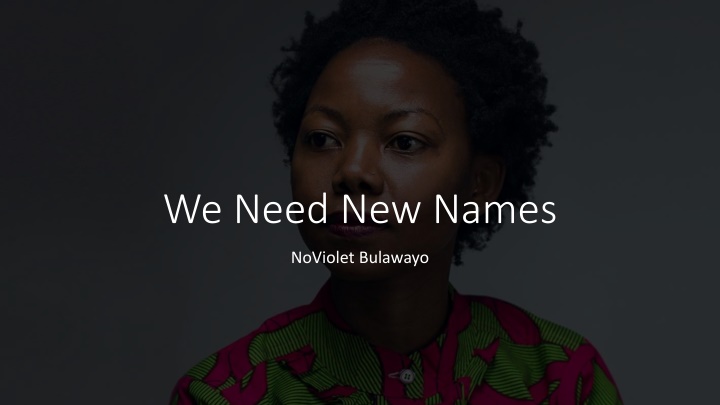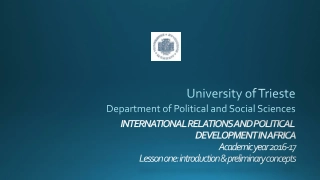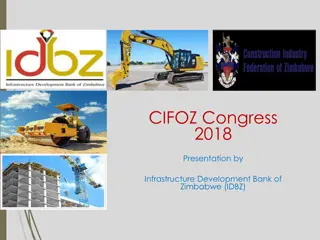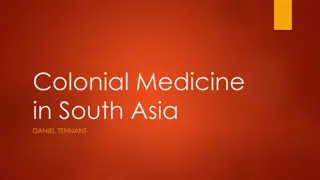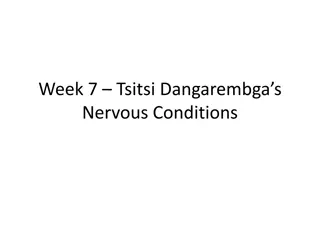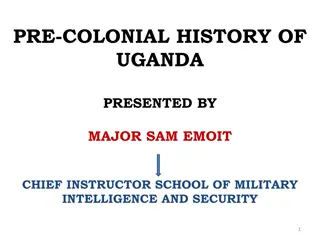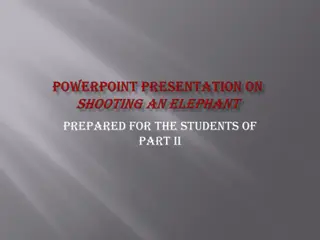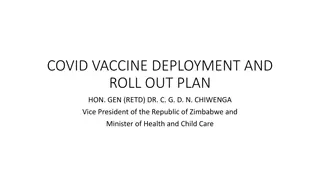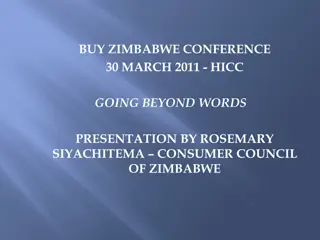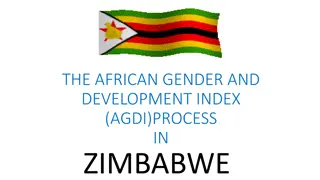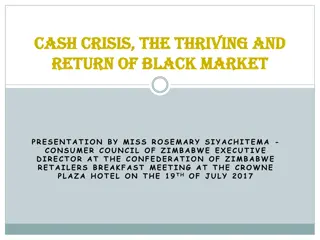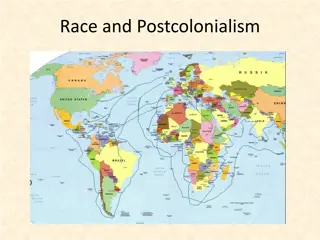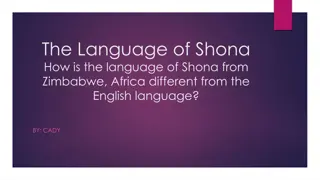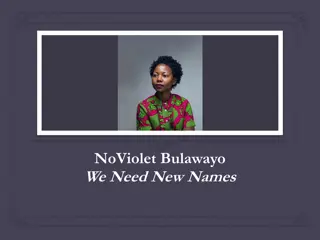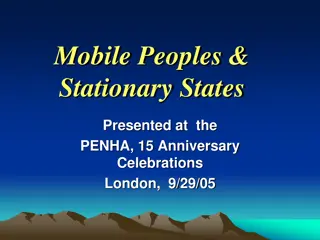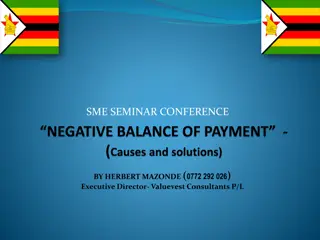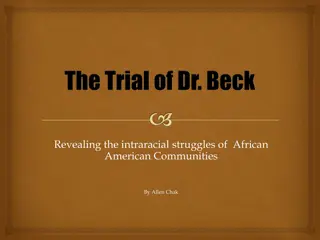Post-Colonial Struggles and African Literature Representation in Zimbabwe
In Zimbabwe, the complexities of Ndebele-Shona history, the repercussions of Gukurahundi massacres, and the challenges of post-colonial state-building intersect with the portrayal of Africa in Western literature. Scholars like Sabelo Ndlovu-Gatsheni and Sarah Brouillette critique how Zimbabwean experiences, particularly Ndebele particularism, are marginalized in narratives that cater to Western readership interests. These discussions shed light on the enduring tensions within Zimbabwe and the broader debates on African literary representations.
Download Presentation

Please find below an Image/Link to download the presentation.
The content on the website is provided AS IS for your information and personal use only. It may not be sold, licensed, or shared on other websites without obtaining consent from the author.If you encounter any issues during the download, it is possible that the publisher has removed the file from their server.
You are allowed to download the files provided on this website for personal or commercial use, subject to the condition that they are used lawfully. All files are the property of their respective owners.
The content on the website is provided AS IS for your information and personal use only. It may not be sold, licensed, or shared on other websites without obtaining consent from the author.
E N D
Presentation Transcript
We Need New Names NoViolet Bulawayo
Zimbabwean History Ndebele-Shona First Chimurenga (1890s) Second Chimurenga (1966-79) Rhodesia-Zimbabwe Gukurahundi Murambatsvina
Gukurahundi massacres (Jan 1983) More than 20,000 civilians killed by Robert Mugabe s feared Fifth Brigade Closely associated with Mugabe s Zanu-PF party s efforts to eliminate opposition groups after independence in 1980 Violence directed at Ndebele people, who overwhelmingly supported Joshua Nkomo, Mugabe s nationalist rival (and ally) in the anti- colonial struggle
Sabelo Ndlovu-Gatsheni, 2008 what I have termed Ndebele particularism is a complex phenomenon that cannot be ignored in the imaginations of a post-crisis Zimbabwe. It is at the root of the problem of how two nations (Shona and Ndebele) with different pre-colonial histories and memories can be invited into one centralised state that masquerades as a state adhering to the Shona worldview. Ndebele particularism does not fit easily into this imagined nation and the state where Ndebele experiences, histories and heroes are subordinated to triumphant and hegemonic Shona history, if not completely ignored. The way the post-colonial state was abused by ZANU-PF in its drive to violently destroy Ndebele particularism set in motion the current Matabeleland politics of alienation, resentment and grievance that are combining to fuel the desire for a restoration of the pre-colonial Ndebele state. There is pervasive fear in Matabeleland that without a state of their own the Ndebele remain in danger of a repetition of Gukurahundi. The Ndebele people have come to realise that states are used as vehicles to suppress unwanted communities and hence their drive for their own state that will cater for their own national interests
Sarah Brouillette, On the African Literary Hustle Bulawayo features centrally in Ikhide Ikheloa s controversial think piece How Not to Write About Africa , which concludes, based on a review of the entries for the 2011 Caine Prize competition, that new writers view Africa through a very narrow prism, all in a bid to win the Caine Prize . Ikheloa predicts Bulawayo s win for her story Hitting Budapest , which became the first chapter in We Need New Names: She sure can write, unfortunately her muse insists on sniffing around Africa s sewers . This assessment draws from a familiar argument about how African literature circulates in Western markets. Critics have argued that writers pander to Western readers drawn to poverty porn stories about darkest Africa ; they produce extroverted or self- anthropologizing works that assume a non-African readership
Sarah Brouillette, On the African Literary Hustle Bulawayo is responding to what can be described as the NGOization of African literature. For the recent renaissance in African literature has had little do with development of viable literary readerships in Africa, and viably capitalized production facilities. The post-independence quest to develop literary readerships and publishing and printing trades faced massive hurdles; it was nearly stopped by IMF & World Bank structural adjustment and trade liberalization in the 1990s, and has now been all but abandoned. The field of contemporary Anglophone African literature relies instead on private donors, mainly but not exclusively American, supporting a transnational coterie of editors, writers, prize judges, event organizers, and workshop instructors. The literary works that arise from this milieu of course tend to be targeted at British and American markets
Sarah Brouillette, On the African Literary Hustle The market scene in Nervous Conditions is part of a journey of development. Tambu learns that she does not want to be subject to charity. She wants to be educated and earn a living for herself by other means. Nervous Conditions presents the power to write one s story as the fruit of the narrator s postcolonial bildungsroman. Having experienced development, Tambu is by the end of her story ready to assess it and critique where necessary, and her work will enter the market as an intervention into an otherwise unquestioned tale of progress. It is largely about gaining a voice; being critical. In We Need New Names, the circumscribed subjects of charity have little scope to aspire to anything better. They fixate instead on fantasies of exit. Bulawayo s work thus presents the sad story the poverty porn not as a conduit to anything but as, quite simply, exhausting. The story one is allowed to tell is less gaining a voice than having to accept posturing as a victim.
We Need New Names, pp. 285-86 I know it s bad, Chipo, I m so sorry. It pains me to think about it, I say. What is so bad? Why are you feeling pain? she says. What they have done to our country. All the suffering, I say. Well, everywhere where people live, there is suffering, she says. I know. But last week I saw on BBC But you are not the one suffering. You think watching on BBC means you know what is going on? No, you don t, my friend, it s the wound that knows the texture of the pain; it s us who stayed here feeling the real suffering, so it s us who have a right to even say anything about that or anything and anybody, she says. Her flippant tone totally come out of nowhere and slaps me in the face, just taking me by surprise. I am so shocked I don t know what to say. What? I can t well, it s my country too. It s our country too, I say. Here, Chipo laughs this crazy womanly laugh and I shake my head and think to myself, What the fuck? Where is this even coming from? It s your country, Darling? Really, it s your country, are you sure? she says Just tell me one thing. What are you doing not in your country right now? Why did you run off to America, Darling Nonkululeko Nkala, huh? Why did you just leave? If it s your country, to have to love it to live in it and not leave it. You have to fight for it no matter what, to make it right. Tell me, do you abandon your house because it s burning or do you find water to put out the fire? And if you leave it burning, do you expect the flames to turn into water and put themselves out? You left it, Darling, my dear, you left the house burning and you have the guts to tell me, in that stupid accent that you were not even born with, that doesn t even suit you, that this is your country?
Sarah Brouillette, On the African Literary Hustle The novel is, then, a self-reflexive work about not wanting to be pigeonholed. It resents the uneven relations that characterize the literary field. These relations ensure the African literary sphere s extroverted reliance on donor support and American consumers
